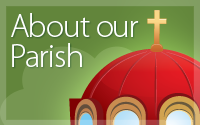Funeral
Funeral Service
The Orthodox Christian Funeral Booklet
The death of a Christian not only affects the family, but also the entire Church, for we are all part of the Body of Christ. The Orthodox Funeral Service, which expresses this fact, is not to be seen primarily as an opportunity to extol, in a sentimental way, the virtues of an individual. Rather, the various prayers and hymns emphasize the harsh reality of death, as well as the victorious Resurrection of Christ through which the power of death is conquered. The Funeral Service comforts those who mourn; it is also the means through which the Church prays for one of its members who has died in the faith of Christ. Orthodoxy views the end of physical existence only as the termination of one stage of life. God's love is stronger than death, and the Resurrection of Christ bears witness to this power.
The Orthodox Funeral consists of three Services. First, there is a Vigil Service after death, which is usually conducted at the time of the wake. This service is called the Trisagion Service. The Church prays to Christ "to give rest with the Saints to the soul of Your servant where there is neither pain, grief, nor sighing but life everlasting." While the Church prays for the soul of the deceased, great respect is paid to the body. Orthodoxy believes the body of the Christian is sacred since it was the Temple of the Holy Spirit.
The body will share also in the final restoration of all creation. The Funeral Service is continued at the Church, where the body is brought on the day of burial. Ideally, the Divine Liturgy is celebrated. After the Funeral Service, the congregation offers its Farewell to the deceased. The Trisaghion Service is repeated at the graveside.
Memorials
Memorial services may not be chanted from the Saturday of Lazarus through the Sunday of Thomas, on any Feastday of the Lord or any Feastday of the Theotokos, nor will they be chanted on a Sunday following a Saturday of the Souls. Please call the church office to schedule a memorial. Days may not be scheduled for exclusivity. All Memorial Services must be accompanied with Kollyva (boiled wheat.) This is another powerful symbol of the Resurrection. (“Most assuredly, I say to you, unless a grain of wheat falls into the ground and dies, it remains alone; but if it dies, it produces much fruit.” John 12:24 also see 1 Corinthians 15:35-38.) Memorials are usually chanted on the 40th day of the death and also on the anniversary of the death thereafter. A Trisagion is chanted in place of the Memorial Service if no kollyva is present.
Memorial Services are also offered during each Saturday of the Soul (Psycosavvato.)
A Memorial Service can not be offered in church for an individual who was cremated or who did not have the Funeral Service read for him in the church.


 Shop the Orthodox Marketplace
Shop the Orthodox Marketplace